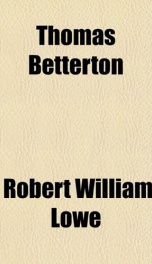thomas betterton

Purchase of this book includes free trial access to www.million-books.com where you can read more than a million books for free. This is an OCR edition with typos. Excerpt from book: CHAPTER III. THOMAS BETTERTON (1635-1660). Among the motley crowd of players that fretted their hour upon the Restoration stage, one figure stands conspicuousthat of Thomas Betterton. Pre-eminent as an actor, he is not less remarkable for his qualities as a man. As the figures of his contemporaries pass before our mind's eye, vague and unsubstantial though they be, there is on most of them the smirch of some scandal, the stain of some crime. Nell Gwynne, Mrs. Hughes, Mrs. Knight, the two Marshalls, even the great Mrs. Barry, bear the imputation of a profligate life. Hart was the paramour of Nell Gwynne; Mountford lost his life because he was believed to have been the successful lover of Mrs. Bracegirdle; George Powell was a drunkard; Goodman, a highway robber; Kynaston is accused, in the filthy lampoons of the time, of gross immorality. Even the Diana of the stage, beautiful Anne Bracegirdle, is the subject of frequent attacks, which attributed her honourable and modest reputation to the cunning with which she concealed her amours. Among this wild rout Thomas Betterton walked unspotted. I have not, in the course of extensive wading through the mud-heaps of Restoration satire, met with one derogatory allusion to him, or to the great actress and good woman who was his wife. Howhigh a tribute this is to their worth can be understood when we remember how profligate and shameless was the life of court and society during much of his career, and how the profligacy was focussed in the theatre. There are some of Dryden's prologues and epilogues so atrocious in their filthiness that the player who spoke them and the audience for whose delectation they were written must have given up even the affectation of decency. And Dryden was not the only sinner, though perhaps he was the chief. ...
Info about the book
Author:
Series:
Unknown
ISBN:
0548131791
Rating:
3.5/5 (2)Your rating:
0/5
Languge:
English
Users who have this book
Users who want this book
What readers are saying
What do you think? Write your own comment on this book!
write a commentGenre
if you like thomas betterton try:
Other books by this author
Do you want to read a book that interests you? It’s EASY!
Create an account and send a request for reading to other users on the Webpage of the book!

